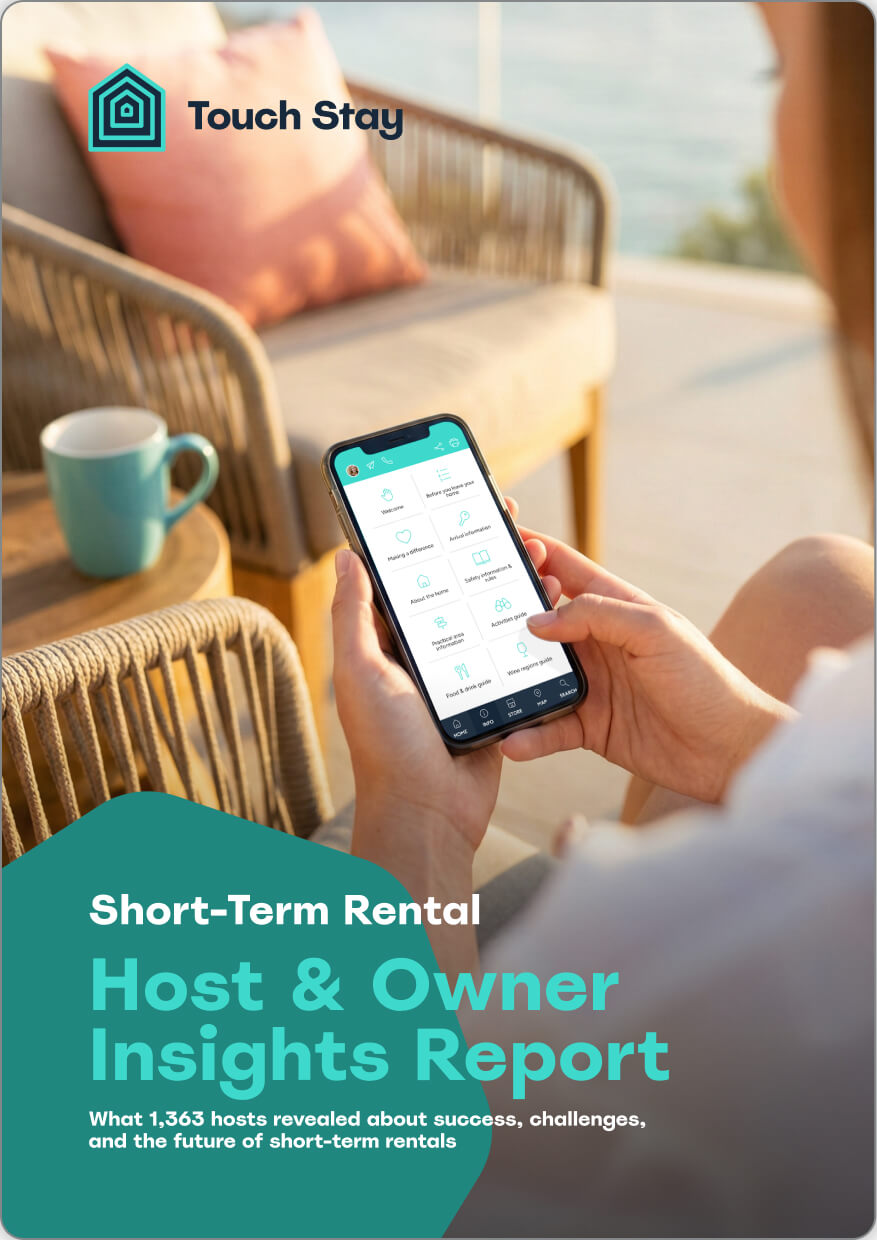Owning or managing a vacation rental on Vrbo can be a great way to generate income, but it’s important to understand the fees that come with using the platform.
Vrbo offers flexibility for hosts, with two main fee structures, both of which can impact your bottom line. No matter if you're opting for an annual subscription or paying fees per booking, mastering Vrbo’s host fees is key to optimizing your rental’s profitability.
Here’s a quick look at the key Vrbo host fees:
- Subscription fees vs. pay-per-booking fees: Choose between a yearly flat rate or a per-reservation fee, depending on your rental activity.
- Commission and processing fees: Vrbo charges a 5% commission fee on bookings and a 3% payment processing fee on total payments, including taxes and refundable deposits.
- Cancellations and security deposits: Hosts have flexibility in setting cancellation policies and security deposit options, both of which can impact earnings and guest satisfaction.
- What are Vrbo host fees?
- Master Vrbo host fees
- Cancellations and security deposits on Vrbo
- What to do next
- Frequently asked questions
But maximizing your success as a host goes beyond just understanding fees. With Touch Stay, you can enhance your guest experience and simplify communication with a beautifully designed digital welcome book.
It helps answer guest questions, showcase property features, and provide local recommendations, leading to better reviews and increased repeat bookings – all while saving you time.
What are Vrbo host fees?
Vrbo offers vacation rental hosts two different fee structures, allowing flexibility based on how often you rent out your property. These fees are to cover the cost of maintaining the platform, including services like secure transactions and customer support.
These the two main fee models:
Vrbo subscription fees
The subscription fee model is ideal for high-volume properties that are rented out frequently. With this option, hosts pay an annual fee of $499. This one-time payment covers all service fees for the year, allowing you to keep 100% of your booking revenue, excluding any payment processing fees.
Key benefits:
- Unlimited bookings without per-booking commissions.
- Simplifies financial planning with predictable costs.
- Access to additional features, like international listings, reservation management tools, and the ability to upload 50 HD photos.
This model is generally more cost-effective for hosts who have a high occupancy rate and expect to generate more than $10,000 annually from their rental.
Vrbo pay-per-booking fees
The pay-per-booking fee model charges a fee for each confirmed booking. This option includes a 5% commission fee on the total rental amount and any additional fees (such as cleaning or pet fees).
On top of that, Vrbo applies a 3% payment processing fee, which covers secure transactions, taxes, and refundable deposits.
Key benefits:
- Pay fees only when your property is booked, no upfront costs.
- Flexibility for hosts with seasonal or less frequent bookings.
- Easier for new hosts or properties generating less than $10,000 annually.
- Avoids large annual payments, allowing you to manage expenses as bookings come in.
This model is suited for hosts with fewer bookings or properties with more seasonal demand, as it allows you to only pay fees when your property is booked.
Master Vrbo host fees
Understanding and mastering Vrbo host fees is a vital part of maximizing your rental income. The two fee models offer flexibility, but how do you decide which one works best for you?
1. Assess your booking frequency
If your property is booked frequently, the annual subscription fee of $499 can be more cost-effective since you avoid paying a commission on every booking. This model is ideal if your property consistently generates bookings throughout the year.
For properties that are booked less often or only during peak seasons, the pay-per-booking fee model might be a better choice. You only pay the 8% combined commission and processing fee when your property is rented, which is likely more manageable for hosts who rent sporadically.
2. Optimize your pricing strategy
Take Vrbo's fees into account when setting your nightly rates and any additional fees, such as cleaning or pet fees. Make sure your pricing strategy covers these costs without deterring potential guests. Be transparent about all fees in your listing to build trust and avoid surprises for travelers.
3. Utilize Vrbo tools
Vrbo provides hosts with a range of tools, including access to reservation management features, listing visibility on international sites, and options to upload high-quality photos to make your property stand out. Use these tools to boost your listing’s appeal, justify your pricing, and increase bookings.
Touch Stay’s guide books are another amazing way to really wow your guests. Learn more about our guide book creation services and start a 14 day free trial!
4. Monitor and adjust
Regularly review your property's performance and adjust your pricing or fee model accordingly. If your property’s demand changes or your bookings increase, it might be time to switch to the subscription fee model to reduce overall fees.
By mastering these fees and strategically managing your listing, you can maximize your income while keeping costs manageable.
📘 Want to offer guests a smoother, more professional experience?
Touch Stay’s digital guidebooks help you reduce repetitive guest questions, boost reviews, and deliver a consistent guest experience — while saving you valuable time.
Book a demo to see how it works for your Vrbo property.
Cancellations and security deposits on Vrbo
Vrbo gives hosts the flexibility to set policies that fit their business model, allowing for better control over bookings and guest management.
Cancellation policies on Vrbo
Vrbo offers hosts five different cancellation policies to choose from, depending on how flexible or strict you want to be with refunds:
- No refund: No refund is offered to the guest after booking.
- Strict: Full refund if canceled within 60 days before check-in.
- Firm: Full refund if canceled at least 30 days before check-in.
- Moderate: Full refund if canceled at least 14 days before check-in.
- Relaxed: Full refund if canceled at least 7 days before check-in.
Your choice of cancellation policy can impact booking rates and guest satisfaction. A more flexible policy may encourage bookings, but it could result in lost revenue if guests cancel last minute. Stricter policies protect your income but might deter potential guests from booking.
Security deposits on Vrbo
Vrbo also allows you to set up security deposits to protect your property against damages. Hosts can either charge a refundable damage deposit or a non-refundable damage waiver.
- Refundable damage deposit:
This is a pre-determined amount that guests pay upfront and is refunded after their stay, provided no damage is reported. Vrbo will process the deposit refund, typically within 14 days of checkout, unless you report damages. - Non-refundable damage waiver:
This option lets you charge a smaller, non-refundable fee to cover any potential damages. While this offers guests a more budget-friendly option, it provides less coverage for hosts in case of major damage.
A refundable damage deposit offers peace of mind for hosts, ensuring that there’s a financial buffer for any unexpected repairs. However, some guests may prefer the convenience of a damage waiver. Consider your property's value and typical guest behavior when setting your security deposit policy.
What to do next
Now that you have a solid understanding of Vrbo host fees and how they impact your rental business, it’s time to take action. Here are some practical steps you can follow to optimize your earnings and manage your property more effectively:
Review your current fees
Take a close look at your current fee model – are you on the subscription plan, or do you pay per booking? Reevaluate based on your rental frequency and income. Switching between fee models could save you money depending on your property’s booking pattern.
Optimize your listing
Make sure your listing is fully optimized with high-quality photos, detailed descriptions, and transparent information about fees. Clearly communicating additional fees like cleaning and pet fees helps in avoiding guest surprises and builds trust.
Adjust your pricing strategy
Consider adjusting your nightly rates to cover Vrbo’s commission and payment processing fees without pricing yourself out of the market. Use tools like Vrbo’s pricing dashboard or third-party software to monitor competitor rates and adjust for seasonality.
Monitor cancellations and security deposits
Reassess your cancellation and security deposit policies to strike a balance between protecting your property and attracting guests.
If you’re seeing last-minute cancellations, it might be worth tightening your policy. Likewise, if guests are deterred by high deposits, consider offering a damage waiver.
Contact Vrbo support
If you have specific questions about your fees or listings, Vrbo’s support team is available to help. You can also check out their Help Center for articles and resources on managing your property effectively.
Here are a few resources to help if you have more questions:
Conclusion
Whether you opt for the subscription fee or the pay-per-booking model, knowing how these fees affect your bottom line will help you create a more effective pricing strategy. Mastering the fee structures, optimizing your listing, and setting clear policies for cancellations and security deposits will put you well on your way to boosting your revenue and enhancing your guests' experience.
Take charge of your property today by reviewing your fees and making adjustments that align with your business goals. The right strategy can turn hosting on Vrbo into quite a profitable venture!
Frequently asked questions
A host fee on Vrbo refers to the charges property owners incur when listing and renting out their vacation rentals. These fees cover the platform’s services, including secure transactions and customer support, and are typically paid as either a pay-per-booking fee (8% total) or an annual subscription fee ($499/year).
Vrbo hosts can choose between two fee structures:
Pay-per-booking: Hosts pay a 5% commission on the booking total (rental rate and additional fees) and a 3% payment processing fee.
Subscription fee: Hosts pay $499/year for unlimited bookings, avoiding the per-booking commission but still paying the 3% processing fee.
Vrbo does not charge a cleaning fee directly to the host. However, hosts can add a cleaning fee to the booking, which is charged to the guest as part of the total rental cost. The cleaning fee is included in the 5% commission fee calculation for hosts using the pay-per-booking model.
Vrbo processes payments through its platform, charging a 3% payment processing fee. Hosts receive their payout one day after the guest checks in, and the funds are typically available in the host’s bank account within 5-7 business days.

Laura Clayton
Laura Clayton is a copywriter with a BA in fiction writing from Columbia College Chicago. From holding a position as a background investigator retained by the United States government, to teaching English, and writing about real estate, Laura has a diverse and varied background. She has been writing for SaaS companies since 2019 in a wide range of industries.
Be the first to know!
Join our newsletter for early access to:
- ✅ Free guides
- ✅ Pro tips & tricks
- ✅ Time saving tutorials
- ✅ Latest blog posts
- ✅ Checklists & templates

















